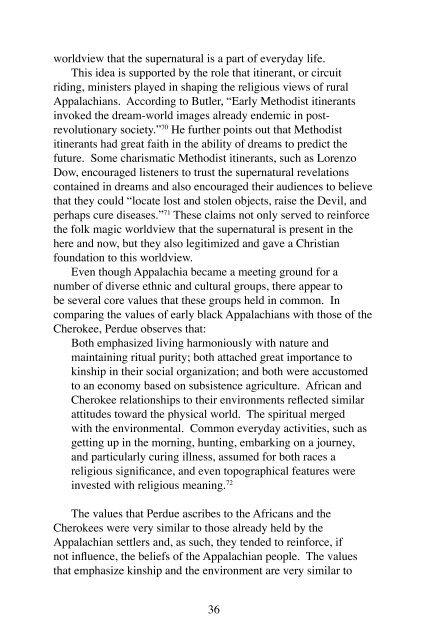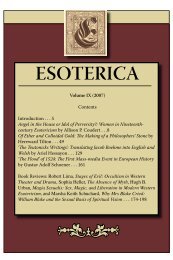Download - Esoterica - Michigan State University
Download - Esoterica - Michigan State University
Download - Esoterica - Michigan State University
Create successful ePaper yourself
Turn your PDF publications into a flip-book with our unique Google optimized e-Paper software.
worldview that the supernatural is a part of everyday life.<br />
This idea is supported by the role that itinerant, or circuit<br />
riding, ministers played in shaping the religious views of rural<br />
Appalachians. According to Butler, “Early Methodist itinerants<br />
invoked the dream-world images already endemic in postrevolutionary<br />
society.” 70 He further points out that Methodist<br />
itinerants had great faith in the ability of dreams to predict the<br />
future. Some charismatic Methodist itinerants, such as Lorenzo<br />
Dow, encouraged listeners to trust the supernatural revelations<br />
contained in dreams and also encouraged their audiences to believe<br />
that they could “locate lost and stolen objects, raise the Devil, and<br />
perhaps cure diseases.” 71 These claims not only served to reinforce<br />
the folk magic worldview that the supernatural is present in the<br />
here and now, but they also legitimized and gave a Christian<br />
foundation to this worldview.<br />
Even though Appalachia became a meeting ground for a<br />
number of diverse ethnic and cultural groups, there appear to<br />
be several core values that these groups held in common. In<br />
comparing the values of early black Appalachians with those of the<br />
Cherokee, Perdue observes that:<br />
Both emphasized living harmoniously with nature and<br />
maintaining ritual purity; both attached great importance to<br />
kinship in their social organization; and both were accustomed<br />
to an economy based on subsistence agriculture. African and<br />
Cherokee relationships to their environments reflected similar<br />
attitudes toward the physical world. The spiritual merged<br />
with the environmental. Common everyday activities, such as<br />
getting up in the morning, hunting, embarking on a journey,<br />
and particularly curing illness, assumed for both races a<br />
religious significance, and even topographical features were<br />
invested with religious meaning. 72<br />
The values that Perdue ascribes to the Africans and the<br />
Cherokees were very similar to those already held by the<br />
Appalachian settlers and, as such, they tended to reinforce, if<br />
not influence, the beliefs of the Appalachian people. The values<br />
that emphasize kinship and the environment are very similar to<br />
36



